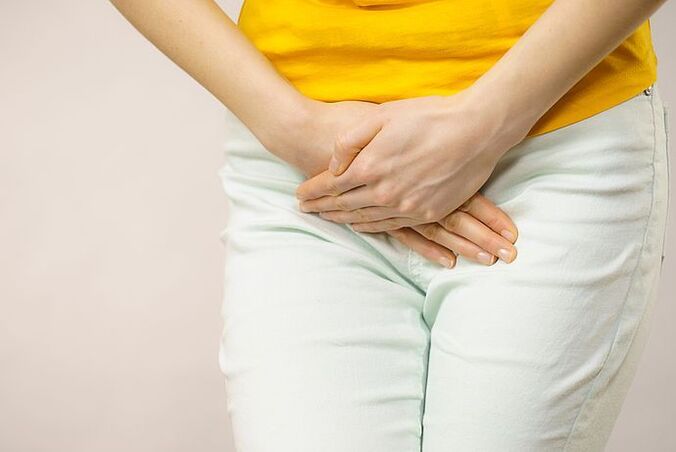
Cystitis is an acute or chronic inflammation of the bladder wall. Manifestations are frequent and painful urination, purulent urine, blood clots, in children accompanied by symptoms of intoxication, fever. The disease is common in all ages and sexes, but is usually identified in women, and is related to the anatomical features of the urinary system.
Symptoms of cystitis
Cystitis is divided into acute and chronic. The acute form is characterized by spontaneous onset and rapid development. The first sign is a frequent urge to urinate every 20-30 minutes. The patient complains of epigastric pain, pain spreading to the perineum, genitals, increased pressure on the abdomen, slightly full bladder. Urination itself is painful with a sensation of heat and pain, the behavior of which ends with the secretion of a few drops of blood. The color and clarity of the urine changes: the urine is cloudy, dark, has sediment, and has an unpleasant odor. With favorable results, the health condition improves in 4-5 days, the patient recovers in 7-10 days.
Chronic cystitis is characterized by alternating exacerbations and remissions or a continuous sluggish course. Symptoms correspond to the acute form, their severity increases in the acute phase.
The reasons
For the development of cystitis, certain conditions are necessary: infection, morphological or functional changes in the bladder. In most cases, the disease is contagious. The main causative agents of cystitis are E. coli, epidermal streptococci, Proteus, Klebsiella, Pseudomonas aeruginosa, enterococci. Microorganisms enter the bladder cavity from the external environment, through the kidneys, less often from other inflammatory foci: through lymph, blood, damaged bladder wall.
A favorable background for the development of cystitis is created by:
- frequent hypothermia;
- infrequent or incomplete urination;
- weakened immunity;
- sedentary lifestyle;
- wearing clothes that are too tight;
- Malnutrition;
- vitamin deficiency;
- physical and psycho-emotional overwork;
- Chronic diseases;
- changing sexual partners or starting sexual activity;
- surgical intervention in the bladder, prostate gland;
- non-compliance with sanitary standards;
- effects on the body of radiation, chemicals and toxic substances;
- treatment with antibiotics and nephrotoxic drugs;
- the presence of foreign bodies: urinary ducts, kidney stones, ureteral stents.
In the development of cystitis, a certain role belongs to diseases and pathological conditions such as diabetes mellitus, urolithiasis, foreskin stenosis in boys / men, prostate tumors, prostatitis, bacterial disorders, intestinal infections, helminthiasis.
Level
Cystitis is classified according to different criteria:
- downstream: acute - characterized by an inflammatory lesion of the mucosa and submucosa, and chronic morphological changes affecting the muscle layer;
- by etiology: bacterial (divided into specific and non-specific) and non-bacterial (chemicals, drugs, radiation, allergies);
- in the form: primary - occurs without structural and functional changes in the urinary system, secondary - develops in conditions of bladder dysfunction, anatomical changes;
- according to the degree of prevalence of the inflammatory process: local (limited) and general (diffuse).
Diagnose
In the diagnosis of cystitis, the urologist is assisted by the clinical manifestations, the results of laboratory and instrumental studies. The main role in the recognition of cystitis, its type, course features belong to the general analysis of urine, urine culture for bacteria, determination of the level of acidity in the urine. As indicated, cystoscopy (cystoscopy) or X-ray (computed tomography), ureteroscopy and bladder ultrasound.
To confirm / rule out cystitis, specialists from the CMRT clinic use modern diagnostic methods, such as:
- MRI (magnetic resonance imaging)
- Ultrasound (ultrasound)
- double-sided scanning
- Computational topography of the Diers . spine
- Examination (a comprehensive examination of the body)
- CT
Which doctor to contact?
Urologists diagnose and treat diseases. Depending on the cause and accompanying symptoms, the disease may require consultation with a gynecologist and other specialists.
How to treat cystitis?
The course of treatment chosen by the urologist, sometimes in collaboration with endocrinologists, gynecologists, infectious disease specialists, gastroenterologists, surgeons, and specialistsother. In the period of acute cystitis, to reduce the symptoms of digestive disorders, it is recommended to follow a dairy-free diet, limit spicy, salty, fatty foods, spices, and procedures to clear the bladder area. . To quickly clear the bladder of toxins, bacteria, inflammatory components, it is necessary to strengthen the oral regimen. In addition to slightly alkaline mineral water, you can drink fruit juices, juices, juices, weak green tea.
Among the drugs for the treatment of uncomplicated urinary tract, diuretics, antibacterial, antimicrobial, antiviral are used, taking into account the type of pathogen. In order to relieve pain, reduce muscle spasms, and stop inflammatory symptoms, it is necessary to use analgesics, non-steroidal anti-inflammatory drugs, and antispasmodics. In addition to the main treatment, after the signs of the disease are in remission will be prescribed male medicine, electrophoresis, hydro-acupuncture.
In the complicated stage, if the disease cannot be cured with conservative treatment, people will perform surgery to remove the bladder or the pathologically changed area by means of excision, laser irradiation, freezing.
Complications
The premises for the development of complications give rise to chronic and secondary forms. Possible side effects include:
- sclerosing deformity of the bladder neck;
- changes in the anatomy and function of the bladder;
- vesicoureteral reflux (backflow of urine from the bladder into the ureter);
- peritonitis;
- pyelonephritis;
- inflammation of the walls of the urethra.
Prevention of cystitis
Prevention of cystitis contributes to:
- exclude hypothermia;
- prevention of physical and psycho-emotional overwork;
- healthy and nutritious food;
- genital hygiene;
- early detection and treatment of infections and comorbidities;
- systematic bladder emptying;
- strengthen immunity;
- adhere to the drinking regime.




























